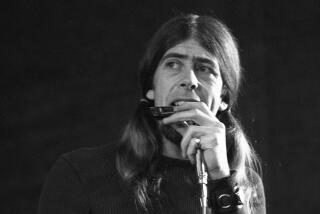PIANIST MAGALOFF: LOYAL TO OLD SCHOOL
If a young musician should stop Nikita Magaloff on a New York street and ask him how to get to Carnegie Hall, the pianist would refrain from offering the standard line: “Practice!”
Chances are, he’d give directions.
“I always advise them to go to concerts,” he says. “I learned so much more from listening than from any of my teachers.” Impressive words, considering the Russian-born pianist’s mentors: Alessandro Siloti (pupil of Liszt, teacher of Rachmaninoff), Isodor Philipp (student of Saint-Saens, teacher of Schweitzer), Sergei Prokofiev and Maurice Ravel.
The 73-year-old musician, absent from Los Angeles for almost 20 years, returns for a recital in Royce Hall on Thursday, an event, he indicates, that should be of more than passing interest to all those young players seeking the road to Carnegie Hall.
“Something is being lost in the moment,” Magaloff notes sadly, during a telephone conversation from his New York hotel. “The old school of playing is disappearing. But I feel that we still have something to offer.”
And what is that? Simply put, he says, it is a way of playing based on personality more than prowess. In his gentle, articulate manner, Magaloff disparages the high-pressure world of competition for prizes, contracts and engagements. “Too many people just want to perform,” he says. “Many are not really meant to go on stage. They all expect to win competitions so that they can concertize.
‘Their careers are usually brief: At 20, they have lots of possibilities; but after 30, they can’t sustain the interest. The problem is that too many of them are afraid to be on the wrong side in terms of interpretation.”
In his youth, Magaloff spent many an evening seated in darkened concert halls learning the varied paths of interpretation. “I feel very lucky to have known all those wonderful musicians,” he muses. “I heard Gieseking, Rachmaninoff, Schnabel, Horowitz. They had different musical personalities. From them, you could understand what playing meant.”
In this age of the jet, Magaloff bemoans another lost facet of artistic development. “I don’t like to travel. It’s much too tiring. I remember many lovely trips on boats, where there was time for exchange with other artists. There’s no time now.”
Inevitably, the conversation turns to Prokofiev and Ravel. How were they as teachers? “I wouldn’t call them ‘teachers,’ ” he responds. “My uncle was a friend of Prokofiev’s and I lived in his house for quite some time. Prokofiev and I knew each other so well, we never had formal lessons.
“Ravel, too, never actually taught me. But just watching him play, hearing the differentiation of tone. The way he brought out the color and the meaning of the music. The young players today don’t have that soft touch anymore.”
The names of other great musicians surface regularly during the conversation: Bartok, whom Magaloff met through his association in the ‘30s with Joseph Szigeti (the violinist eventually became his father-in-law); Stravinsky, an occasional musical collaborator and a frequent host to the Magaloffs on visits to Los Angeles; Dinu Lipatti, whose master classes Magaloff took over at the Geneva Conservatory in 1949 (the Magaloffs still call Geneva home).
Of his relationships with most of this century’s great composers, Magaloff insists that such personal acquaintanceships are not necessary in understanding the music. Case in point: Chopin, a composer long linked with Magaloff (and represented at his UCLA program by the 24 Preludes). On more than one occasion, Magaloff has presented concert series devoted to a traversal of the Polish composer’s music. His way with Chopin, the pianist exclaims, is often misunderstood: “Too many people think my interpretation is quite free. But my idea is to try and get into what a composer really wanted. There are, after all, indications in the score.
“You know, music always remains above the interpreter. I believe that interpretation should always be moving. To me, the discovery is wonderful. If I feel I was on the decline, I would stop playing. The point is to always go further and better as long as you can.”
More to Read
The biggest entertainment stories
Get our big stories about Hollywood, film, television, music, arts, culture and more right in your inbox as soon as they publish.
You may occasionally receive promotional content from the Los Angeles Times.










